Medically review by Kim Langdon
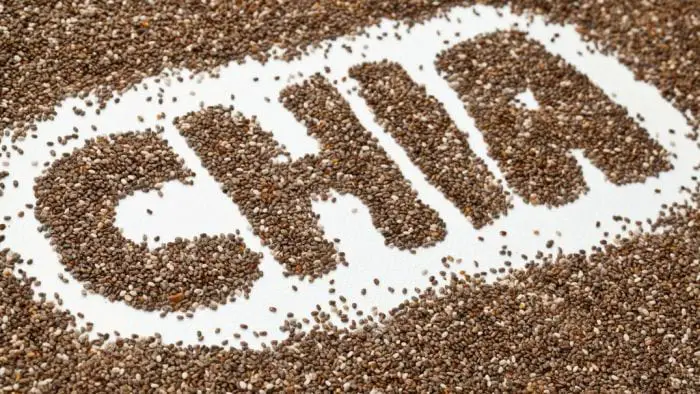
We've discussed countless "superfoods" on the blog, but perhaps the type of superfood we love the most are the tiny ones that pack a big punch.
Essentially, that's what a super food is - a concentrated source of nutrition.
This often means that big things come in small packages. The chia seed is no exception.
This versatile pantry staple is incredibly easy to fit into your diet, and there's no reason not to.
With growing demand and popularity, you can often find them for a small price at budget food stores and in the bulk section, making it affordable to stay stocked up and healthy.
What are chia seeds?
Chia comes from the Salvia hispanica plant. Chia seeds are sometimes also used medicinally.
They mostly grow in warm climates and are grown for use primarily in Mexico and Guatemala, and have been used in Mayan and Aztec culture for centuries.
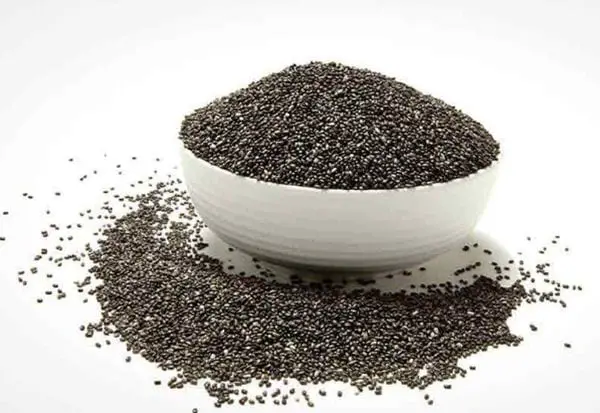
The seeds are a small oval or circle shape, often ranging in color from a dark brown to black-grey. You might also come across golden chia seeds or white chia seeds with a lighter shade.
Chia seeds are nearly tasteless. If anything, they have a mildly nutty flavor that pairs well with both sweet and savory foods.
They were once more popular in Chia Pets, a novelty at-home "garden" which sprouted the chia seeds and resembled hair on a head. Remember those?
Nowadays, these seeds are common additions to smoothies, yogurt bowls, toast, salads, and baked goods. But hey... if you're still rocking the Chia Pet, good on you!
Fun fact: Chia also means "strength."
The benefits of chia seeds
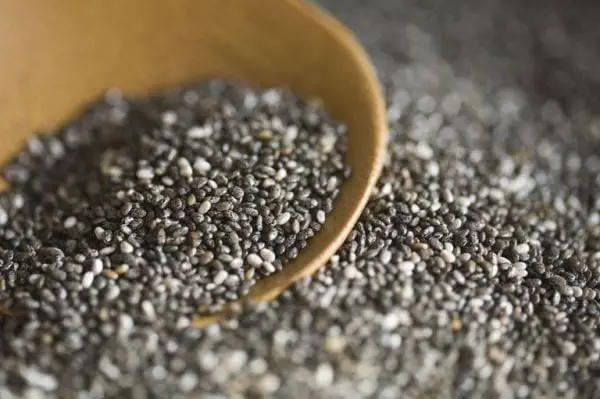
What's so good about this little seed anyway? Well, let's break it down. First, let's look at the nutritional properties of chia seeds, ounce for ounce.
Calories: 137
Carbohydrates: 12.3 g
Fibre: 10.6 g
Fat: 8.6 g
Protein: 4.4 g
Calcium: 177 mg
Phosphorus: 265 mg
Potassium: 44.8 mg
Zinc: 1.0 mg
Copper: 0.1
Manganese: 0.6 mg
... plus 4,915 mg of omega-3 fatty acids! Just from this, we know chia seeds are an incredible source of fiber.
It's net carbs come in around 2 grams per servings, making them an awesome addition to any diet from plant-based to keto.
It's jam-packed with healthy fats, plant protein, and important minerals.
What's not to love?
1. They're great for digestion
A single serving of chia seeds can give you all the fiber you need in a day.
Fiber aids digestion in big ways, and without it, it's easy to get backed up. In fact, chia seeds can act as a gentle, all-natural laxative if you need it.
Getting in your daily dose of chia can help keep you regular which is a great indication of being healthy overall.
2. They can help you lose weight
Two of the most essential components for weight loss are fiber and protein.
A balance of the two helps you stay full and stave off hunger in between meals, helping you stick to a sustainable calorie deficit without feeling hungry, or worse - hangry.
Chia seeds are an incredible source of both. The fibrous seeds gel up after eating, naturally taking up a bit more space in the gut while digesting slowly and steadily.
This powerful seed is also a complete plant protein which means it contains all of the essential amino acids.
That way, you can get those gains with a little less meat.
They can also help to stabilize blood sugar which means you won't experience the spikes and drops that lead to cravings and hunger before your next meal.
3. They aid in good bone health
Have you heard the myth that people who don't eat dairy don't get enough calcium?
Clearly, whoever is spreading these rumors isn't familiar with chia seeds! Per ounce, chia seeds contain 179 mg of calcium which equates to 13% of the recommended daily value.
Calcium is important not only for developing bodies but for maintaining strong and stable bones, reducing the risk of osteoporosis.
4. They're loaded with antioxidants
Antioxidants are one of the main reasons a healthy diet should include plenty of fruits and veggies loaded with micronutrients.
Most colorful foods have high antioxidant content, but so do chia seeds!
These antioxidants act as a natural preservative for chia seeds' fatty acids so they don't go rancid. You don't get those good benefits from rancid fats.
Not only do chia seeds have a long shelf life and built-in nutrient preservation; these antioxidants also help fight free radicals in the body which keeps your body in natural detox mode while warding off disease like cancer.
5. They help balance essential fatty acids
Everyone needs a balance of both omega-3 fatty acids and omega-6 fatty acids. The unfortunate reality with the Standard American Diet is that our ratio is way out of whack!
Ideally, we have a 1:1 ratio, but processed foods, refined oils, conventional meat, and dairy have many people with far more omega-6 fatty acids than omega-3s.
One ounce of chia seeds provides approximately as many essential fatty acids as two servings of salmon.
Considering the daily recommendation for omega-3s is about four grams, you can easily get your fill with less than an ounce of chia.
6. They're great for the gut
If you put chia seeds in water, you'll notice that after an hour or two, they begin to gel up. This is why chia pudding and chia eggs (more on that, next) are a thing!
Unsurprisingly, they act roughly the same way in the stomach. When you eat chia seeds, they end up expanding in the gut. It might sound uncomfortable, but it's actually quite beneficial.
This is due to their soluble fiber content which makes chia seeds a fantastic source of prebiotics.
In short, you need prebiotics for probiotics to be effective. Thus, chia seeds are great for managing healthy gut flora.
7. They can reduce systemic inflammation
One of the driving factors of systemic inflammation - which can exacerbate or cause autoimmune flares and increase gut permeability or "leaky gut" - is the imbalance of omega-3 fatty acids and omega-6 fatty acids.
A healthy diet overall (and one that includes chia seeds) can reduce inflammation, chronic pain, and uncomfortable bloating by addressing the core issues.
8. They're a natural energy booster
Chia seeds are a nearly perfect food. With a strong and mighty blend of slow carbs, healthy fats, plant protein, and fiber, these seeds offer up an amazing boost.
Not only will they give you a quick jolt - this energy is sustainable.
Have a scoop before a workout for stronger lifts and faster runs, or use them as an afternoon pick-me-up when the office starts to get you down.
How to use chia seeds
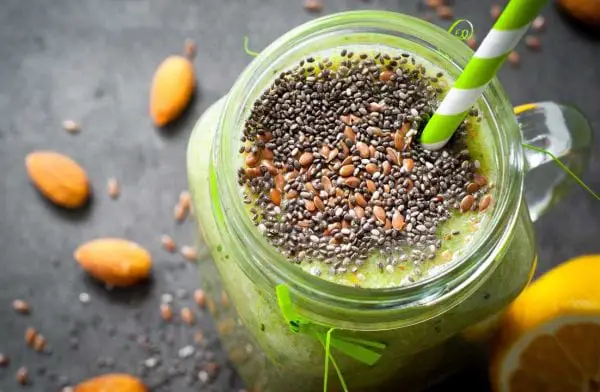
Chia seeds are wildly versatile. They're good on their own in many ways, but there are so many fun recipes to use them in.
Sometimes, they're just a nice add-in while other times, it's really the shining star of the dish. If you're looking to get more chia seeds in your diet for the fantastic benefits, here are a few recommendations.
1. Add them to your smoothie. You can mix them in after you're done blending, or you can toss in 1-3 tablespoons prior to blending. The latter option can improve the thickness of your smoothie as the seeds will gel upon being exposed to liquid.
2. Make chia pudding. Because chia seeds naturally gel, they make a great pudding. To make chia pudding, simple soak 3-5 tablespoons of chia seeds overnight in your milk or dairy-free milk alternative of choice. You can add in your favorite powders and other seeds like flax or hemp here.
In the morning, it will be a thick and decadent breakfast treat. Best of all, you can customize it to your taste. Use ground chia seeds for the same effect if you don't like the texture of them whole. Top the final product off with nut butter, fruit, and whatever else you like.
3. Use them as an alternative to eggs. This is a great tip for those who don't eat eggs! Mixing one tablespoon of chia seeds with two tablespoons of water and letting it gel makes an egg substitute suitable for baking. It acts as a binder, and it actually does a great job of it (while adding some extra nutrition!).
4. Add them to your oatmeal. Chia seeds give a hot bowl of oats an awesome crunch and some added benefit. Like with chia pudding, you can also add a scoop to your overnight oats for a thicker result as the mixture sets overnight - it's a tasty porridge and pudding fusion.
5. Top your yogurt with chia seeds. Both sweet yogurt creations and savory yogurt bowls are made better with the addition of chia seeds. It's a great way to boost your breakfast or your snack time.
6. Add it to water or juice. If you want a digestion boost and natural energy drink, just add 1-2 tablespoons to juice or water. Let it sit for about an hour until the chia seeds are gelled and enjoy your drink. This only works if you enjoy the texture of the seeds!
7. Sprinkle them on your fruit or veggies. Chia seeds give apples and bananas a great crunch, especially paired with nut butter. They're also a fantastic replacement for nuts or seeds on a fresh green salad... and doubly fibrous!
8. Make a super seed blend. Combine your chia seeds with flaxseeds, hemp seeds, buckwheat, popped amaranth, or your favorite crunchy superfoods for a "super seed" blend. I love having this handy for an easy topping in my oatmeal and yogurt bowls.
How to store chia seeds
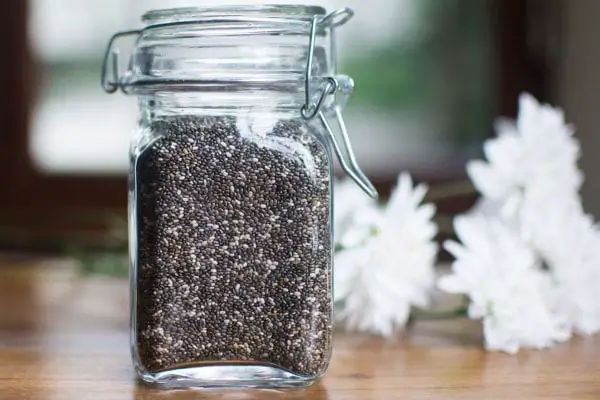
Considering chia seeds have such a high antioxidant complex, they have a very long shelf life. In fact, you can keep them for years without replacing them or even needing to refrigerate them.
While you can keep them in the refrigerator without impacting nutrition, you can easily store them in a cool, dry place. Just make sure to pack them in an airtight container.
I like to store mine in a mason jar in the pantry, away from light and temperature fluctuations.
We hope you learned a ton about this wonderful little seed today, and you're inspired to add a bit more chia to your diet. Enjoy its versatility, benefits, and endless possibilities!
This article was fact checked for accuracy by Dr. Kim Langdon, MD. As always, this is not personal medical advice and we recommend that you talk with your doctor.
Share on Pinterest
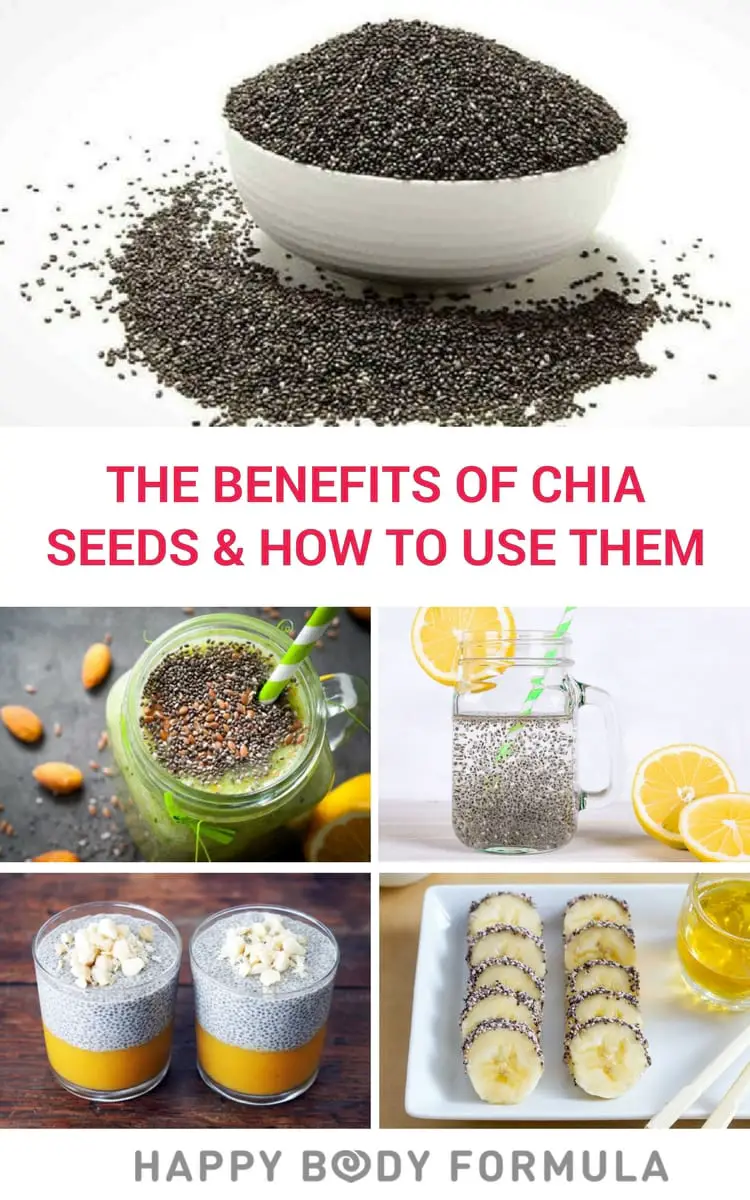
1. Ayerza R, Coates W. Chia seeds: new source of omega-3 fatty acids, natural antioxidants, and dietetic fiber. Southwest Center for Natural Products Research & Commercialization. Tucson: Office of Arid Lands Studies; 2001.
2. Bresson JL, Flynn A, Heinonen M, et al. Opinion on the safety of Chia seeds (Salvia hispanica L.) and ground whole Chia seeds, as a food ingredient. J Eur Food Safety Authority. 2009;996:1–26.
3. Ixtaina VY, Nolasco SM, Tomas MC. Physical properties of chia (Salvia hispanica L.) seeds. Ind Crop Prod. 2008;28(3):286–293. doi: 10.1016/j.indcrop.2008.03.009.
Kimberly Langdon M.D. is a retired University-trained obstetrician/gynecologist with 19-years of clinical experience. She delivered over 2000 babies to mothers in a suburban Midwestern community.

